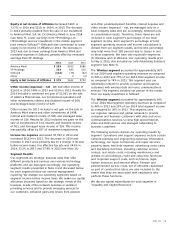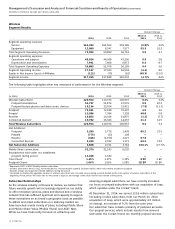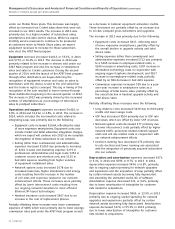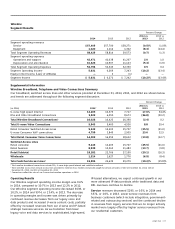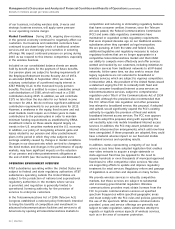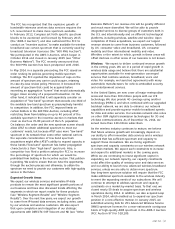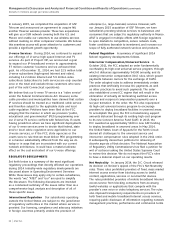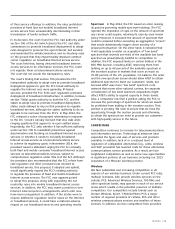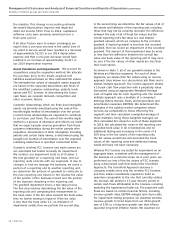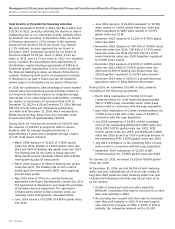AT&T Uverse 2014 Annual Report Download - page 22
Download and view the complete annual report
Please find page 22 of the 2014 AT&T Uverse annual report below. You can navigate through the pages in the report by either clicking on the pages listed below, or by using the keyword search tool below to find specific information within the annual report.
Management’s Discussion and Analysis of Financial Condition and Results of Operations (continued)
Dollars in millions except per share amounts
20
|
AT&T INC.
competition and reducing or eliminating regulatory burdens
that harm consumer welfare. However, since the Telecom
Act was passed, the Federal Communications Commission
(FCC) and some state regulatory commissions have
maintained or expanded certain regulatory requirements
that were imposed decades ago on our traditional wireline
subsidiaries when they operated as legal monopolies.
We are pursuing, at both the state and federal levels,
additional legislative and regulatory measures to reduce
regulatory burdens that are no longer appropriate in a
competitive telecommunications market and that inhibit
our ability to compete more effectively and offer services
wanted and needed by our customers, including initiatives to
transition services from traditional networks to all IP-based
networks. At the same time, we also seek to ensure that
legacy regulations are not extended to broadband or
wireless services, which are subject to vigorous competition.
In November 2014, the president of the United States issued
a statement urging the FCC to reclassify both fixed and
mobile consumer broadband Internet access services as
telecommunications services, subject to comprehensive
regulation under Title II of the Communications Act of 1934
(the Act). Although the president also recommended that
the FCC refrain from rate regulation and other provisions
less relevant to broadband service, this proposal, if adopted
and upheld, would significantly expand the FCC’s existing
authority to regulate the provision of fixed and mobile
broadband Internet access services. The FCC now appears
poised to adopt this proposal, along with expanding the
net neutrality rules into mobile broadband Internet access
services. In addition, the FCC may assert jurisdiction over
Internet interconnection arrangements, which until now have
been unregulated. If these proposals are adopted, they could
have a material adverse impact on our fixed and mobile
broadband services and operating results.
In addition, states representing a majority of our local
service access lines have adopted legislation that enables
new video entrants to acquire a single statewide or
state-approved franchise (as opposed to the need to
acquire hundreds or even thousands of municipal-approved
franchises) to offer competitive video services. We also
are supporting efforts to update and improve regulatory
treatment for retail services. Regulatory reform and passage
of legislation is uncertain and depends on many factors.
We provide wireless services in robustly competitive
markets, but those services are subject to substantial
and increasing governmental regulation. Wireless
communications providers must obtain licenses from the
FCC to provide communications services at specified
spectrum frequencies within specified geographic areas
and must comply with the FCC rules and policies governing
the use of the spectrum. While wireless communications
providers’ prices and service offerings are generally not
subject to state regulation, states sometimes attempt to
regulate or legislate various aspects of wireless services,
such as in the area of consumer protection.
of our business, including wireless data, U-verse and
strategic business services, will apply some pressure
to our operating income margin.
Market Conditions During 2014, ongoing slow recovery
in the general economy continued to negatively affect our
customers. Our business and residential customers have
continued to purchase lower levels of traditional wireline
services and are increasingly price sensitive in selecting
offerings. We expect continued pressure on pricing during
2015 as we respond to this intense competition, especially
in the wireless business.
Included on our consolidated balance sheets are assets
held by benefit plans for the payment of future benefits.
Our pension plans are subject to funding requirements of
the Employee Retirement Income Security Act of 1974,
as amended (ERISA). In September 2013, we made a
voluntary contribution of a preferred equity interest in
AT&T Mobility II LLC to the trust used to pay pension
benefits. The trust is entitled to receive cumulative annual
cash distributions of $560, which will result in a $560
contribution during 2015. In addition, we will contribute
$175 no later than the due date for our federal income
tax return for 2014. We do not have significant additional
contribution requirements to our pension plans for 2015.
However, a weakness in the equity, fixed income and real
asset markets could require us in future years to make
contributions to the pension plans in order to maintain
minimum funding requirements as established by ERISA.
Investment returns on these assets depend largely on
trends in the U.S. securities markets and the U.S. economy.
In addition, our policy of recognizing actuarial gains and
losses related to our pension and other postretirement
plans in the period in which they arise subjects us to
earnings volatility caused by changes in market conditions.
Changes in our discount rate, which are tied to changes in
the bond market, and changes in the performance of equity
markets, may have significant impacts on the valuation
of our pension and other postretirement obligations at
the end of 2015 (see “Accounting Policies and Estimates”).
OPERATING ENVIRONMENT OVERVIEW
AT&T subsidiaries operating within the United States are
subject to federal and state regulatory authorities. AT&T
subsidiaries operating outside the United States are
subject to the jurisdiction of national and supranational
regulatory authorities in the markets where service
is provided, and regulation is generally limited to
operational licensing authority for the provision of
services to enterprise customers.
In the Telecommunications Act of 1996 (Telecom Act),
Congress established a national policy framework intended
to bring the benefits of competition and investment in
advanced telecommunications facilities and services to all
Americans by opening all telecommunications markets to





